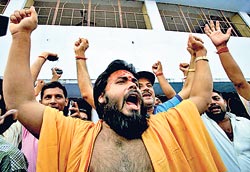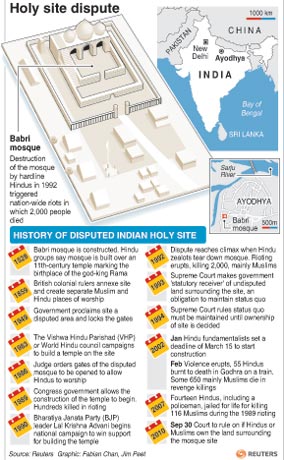NEW DELHI, (AFP) - The Ayodhya ruling dividing a disputed holy site between Hindus and Muslims may prove flawed, but could also allow a progressive India to turn the page on its unstable sectarian past, analysts said.
While legal experts debated the pros and cons of the landmark High Court judgement that carved up the site in the northern town of Ayodhya, historians and commentators focused on the implications for India's image as an emerging global power committed to secularism and the rule of law.
 |
| A Hindu priest shouts slogans as he celebrates after hearing the first reports of a court ruling in the northern Indian town of Ayodhya September 30 |
There was also unanimous relief at the measured response from all sides to the verdict.
Security had been tightened across India to prevent a repeat of violence in 1992 when Hindu zealots tore down a 16th century mosque at the Ayodhya site.
Around 2,000 people, most of them Muslims, died in the riots that followed.
While some analysts wielded the word "compromise" as a criticism of the High Court ruling, others praised it for offering a viable way forward on a dispute with such an emotive and violent past.
"This verdict is not unassailable, but it seems like a workable compromise," said Pratap Bhanu Mehta, president of the Delhi-based Centre for Policy Research. "The question to ask is whether the compromise takes us forward in the direction of the constitutional values we cherish," said Mehta, who argued that the court had succeeded in accommodating religious claims without jeopardising the secular character of the state.
"This will not satisfy purists. But it is not an implausible way of strengthening secularism," he said.
Historian S. Irfan Habib said the ruling was crucial for finally putting a "judicial stamp" on an issue that for too long had been the preserve of religious ideologues.
"It seems that modern India cannot be easily duped for a medieval cause anymore," Habib said.
"A large number of Indians are cynical and tired of this issue and want to see it resolved through peaceful and constitutional means."
Press reaction was largely positive, with some editorials seeing the judgement as a turning point for a country which is increasingly keen to shed the communal venom of the past.
India and neighbouring Muslim Pakistan were both born in strife, after their creation via the partition of the then British-ruled subcontinent in 1947 led to religious clashes that left up to a million people dead.
But India has avoided any major outbreak of Hindu-Muslim violence since riots in the western state of Gujarat in 2002 and some saw Thursday's ruling as further proof that the country has moved on.
"A new, resurgent India has emerged from the debris of the violent 1990s. A new generation has come of age since then and it doesn't want to be tied down by ancient hatreds," the Times of India said.
With the verdict set to be appealed in the Supreme Court, noted historian Ramachandra Guha cautioned that it was still too early to declare a new beginning.
"Whether we have indeed moved on will not be known for some time yet," Guha said, adding that he would have preferred to see the government take over the site years ago and put it to a non-religious use. "That would have equally offended the Muslim bigot and the Hindu bigot, but perhaps struck a chord with the public as a whole,' he said.
"In the meantime, one can hope India moves on further, placing emphasis on decent education, affordable healthcare, and a dignified livelihood, rather than re-living the sectarian disputes of the recent or ancient past."Several legal experts questioned the decision of the court to formally recognise the Hindu belief that the Ayodhya site was the birthplace of the Hindu god, Lord Ram.
For the president of the Indian Rationalist Association, Sanal Edamaruku, the judges had strayed into an area they had no place being. "It should not be on the agenda of any court to decide if a mythological character existed or not, let alone determine where he was born," Edamaruku said.
"It makes a nonsense of the whole process."
|



